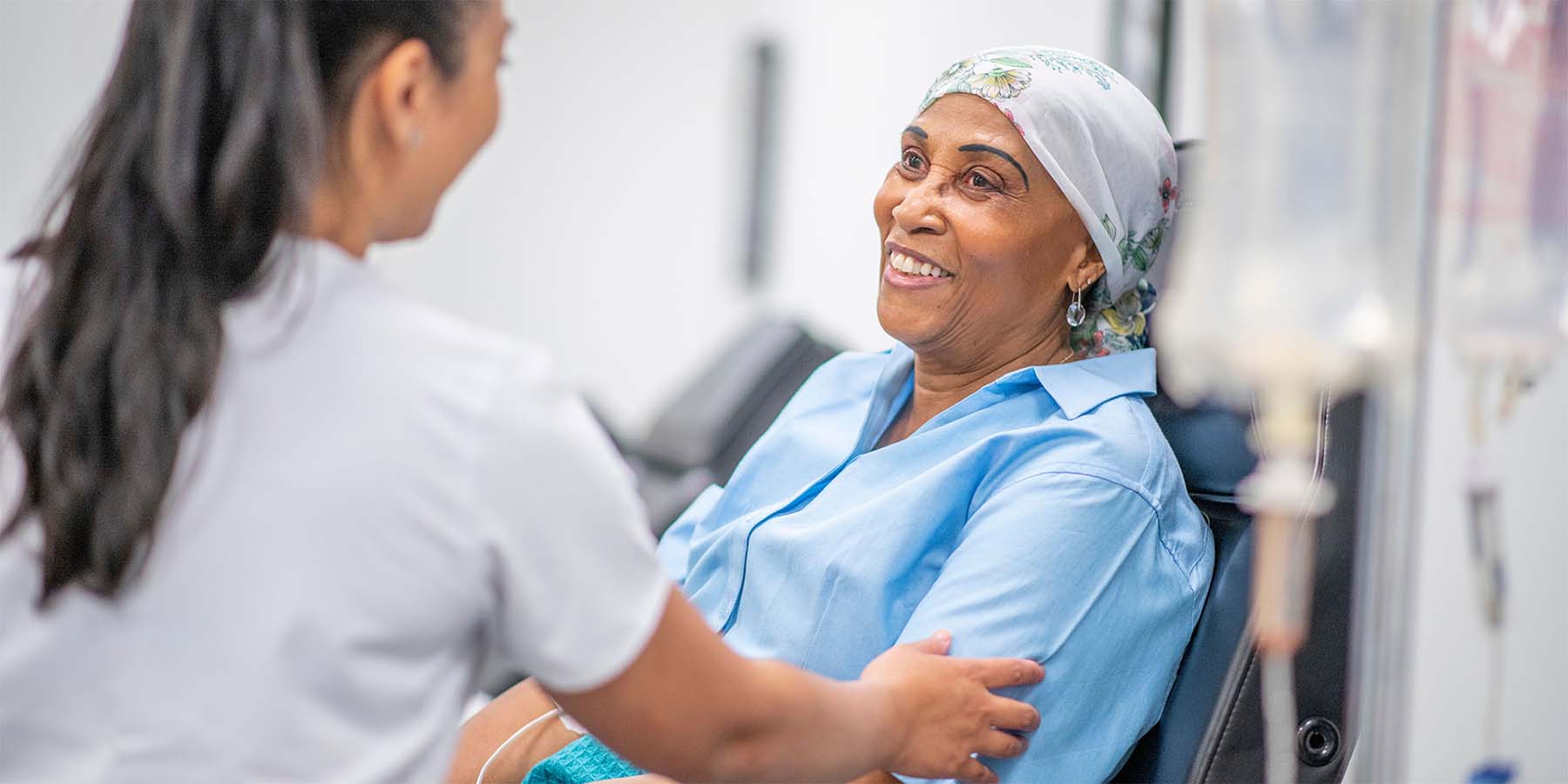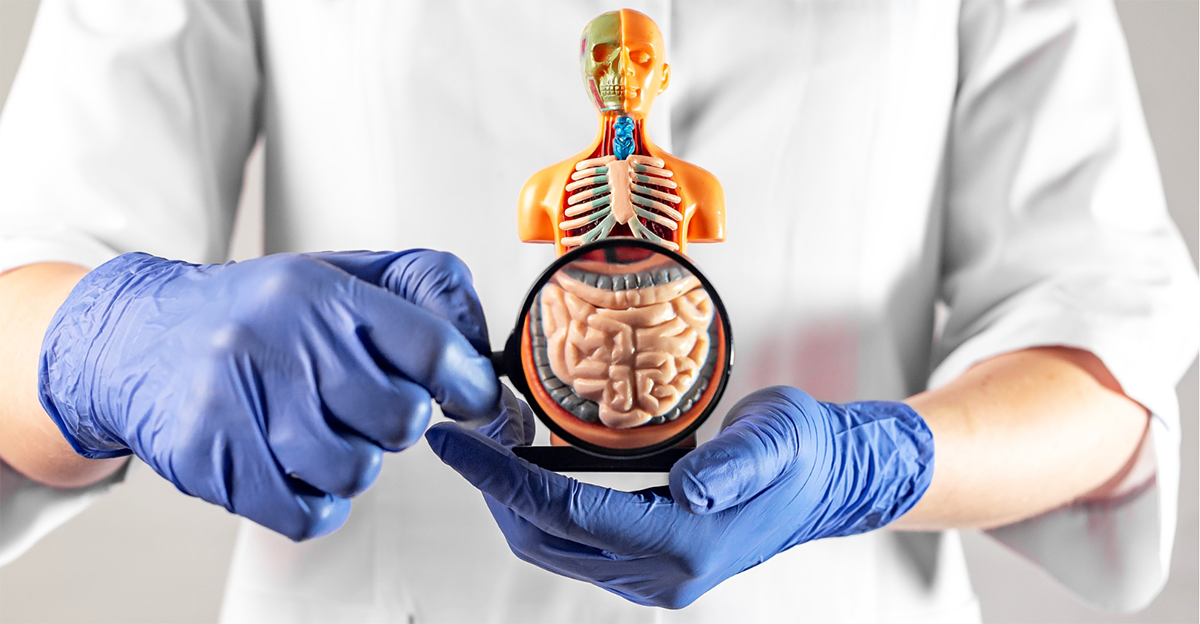Alex Rolland: Improving Cancer Diagnostics with Exosomal ct-DNA
Oftentimes, there isn’t a simple black-and-white answer to the questions we ponder most. If you’re lucky, the biggest decision you may need to make today is what to have for dinner. However, getting answers about your health and well-being shouldn’t be a long, daunting process. Luckily, researchers worldwide are working to help provide more concrete answers to questions regarding patient health. Farewell to the days of wondering. Alex Rolland and his team at Cancer Treatment Options and Management Inc. are working towards answering oncologists' most asked questions, like: is this treatment working? Is this patient in remission? And more. Read Alex Rolland's success story below to discover how his team’s research aspires to improve conditions around cancer treatment options and brighten its future with more certainty.
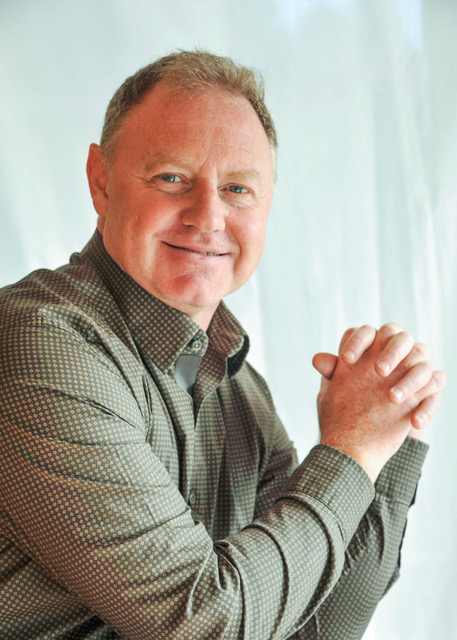
Why I Use Norgen
My name is Alex Rolland, and I am the co-founder and chief scientist of Cancer Treatment Options and Management Inc. (CTOAM) and Liquid Biopsy Labs. I first heard of Norgen Biotek in late 2018/early 2019 when our digital PCR blood-based liquid biopsy lab was looking for ct-DNA extraction kits. My lab manager and I tested many different kits and looked at many reviews. However, everything we tried failed to achieve an amount of ct-DNA that would get results with our Taqman-ddPCR platform. I was attracted to Norgen’s kits based on the ease of extraction of their centrifuge-based technology, and the initial micro kit allowed us to obtain a small but testable amount of ct-DNA. I called the company and spoke with a Senior Research Scientists, who told me Norgen was working on a new procedure that used two different-sized columns and asked if I would like to test it out. I jumped at the opportunity as, up to that point, Norgen was the only company that gave us desired results. Additionally, we had been using a ct-DNA preservation tube from a large company that allowed us to obtain between 2-4 mL of plasma/serum from two tubes. However, these tubes were problematic, and Norgen’s Senior Research Scientist urged me to try Norgen’s cf-DNA/cf-RNA Preservative Tubes (Cat. 63950). Once again, the results were amazing, and we were able to obtain as much as 7-10 mL of plasma/serum from 2 tubes. This significantly improved our yield and allowed us to move forward with real-life testing.
We tested Norgen’s Plasma/Serum Cell-Free Circulating DNA Purification Midi Kit (Cat. 55600) and Plasma/Serum Exosome Purification and RNA Isolation Midi Kit (Cat. 58500), and the results were phenomenal. In short, we collected blood from cancer patients with known mutations and monitored their responses to treatment using the Norgen Midi Kits. Importantly, as we were using this tool for monitoring, we only looked for ct-DNA associated with active tumours (i.e. released from exosome/exosome-attached etc.) and not DNA from apoptosis or cell death. We found that the cancer-associated ct-DNA is specific to fragments of DNA 146bps and under, and fragments above this size are usually associated with dying tumours/apoptosis/lysis. This is important because the Norgen extraction kits focus on small fragments of ct-DNA and have allowed us to focus on cancer-associated ct-DNA.
To summarize the benefits we have found with the Norgen products.
(1) High yield of plasma/serum from blood tubes.
(2) High yield of cancer/exosome associated ct-DNA from their extraction kits.
Examples of our results ct-DNA
To date, we have created 100’s of custom TaqMan probes to monitor cancer patients using mutations in oncogenes, tumour suppressor genes, and Variants of Unknown Significance (VUSs).
Case 1
CRC patient with a VUS in PRKDC (tumour suppressor gene). This was a VUS identified in the patient’s tumour DNA sequencing. We did an in-silico analysis/sequence conservation analysis that showed this was highly likely to be pathogenic. Indeed, we then used it to detect early recurrence and the benefit of treatment in this patient.
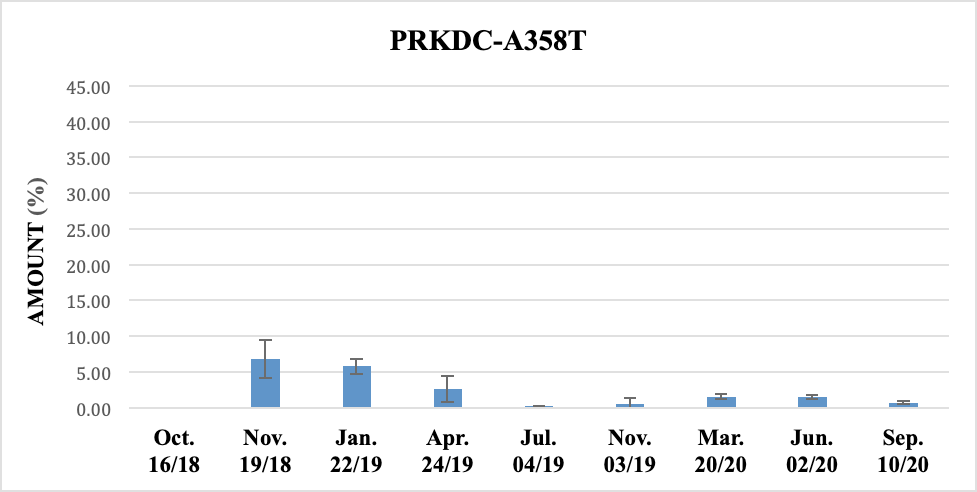
Case 2
This patient had late-stage breast cancer, and our sequencing identified a PIK3CA mutation. At the time, Alpelisib (a drug used to treat specific types of breast cancer) was not approved in Canada, so we contacted the drug maker and persuaded them to provide it for free, obtained compassionate access from Health Canada, and monitored the patient response using ct-DNA. Unfortunately, in this case, the patient could only tolerate the drug for a short period of time and had to be taken off. As you can see, our test indicated the expected increase in ct-DNA without the beneficial treatment.
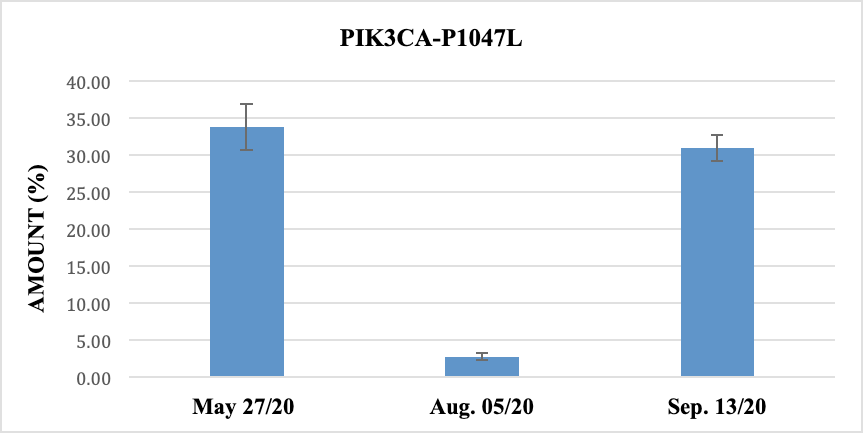
Case 3
In this case, a woman with lung cancer was thought to have progression while on immunotherapy. The patient’s doctor had told her that they would be taking her off immunotherapy due to the increase in tumours, and she would have no further options. However, pseudoprogression occurs in about 30% of patients on immunotherapy due to a rapid increase of immune cells within the tumour, causing an increase in the size and number of visible tumours. Unfortunately, there is no reliable way to detect this using imaging diagnostics (CT, MRI, etc.) as these tumours will even look hot on a PET-CT even though they may be necrotic (due to increased SUV from immune cells). Using ct-DNA, we were able to show the oncologist that the patient was indeed experiencing pseudoprogression. This discovery allowed the patient to stay on the immunotherapy and continued to get an excellent response from their treatment.
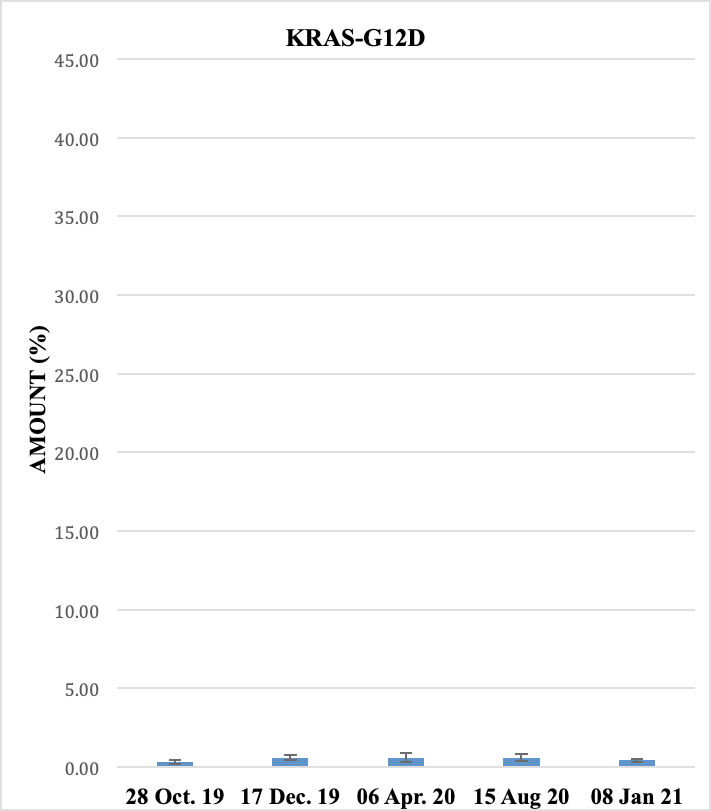
Case 4
In this case, the patient achieved a significant response from chemotherapy. The patient later went on to do immunotherapy, but unfortunately, the ct-DNA showed significant progression, indicating that the immunotherapy was not working. This real-time data allowed the patient’s doctor to adjust their treatment plan.
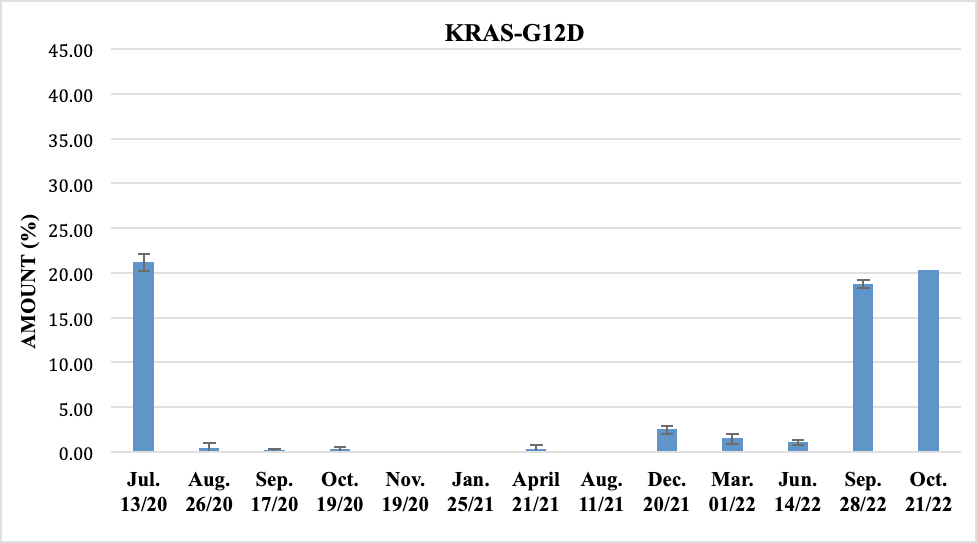
Norgen Biotek’s Role
Recently, Norgen has worked with us to isolate blood-based exosomes and exosomal-RNA at a high enough concentration to allow RNA-seq-based expression testing. Using our unique RNA seq-based expression protocol, we were able to obtain the expression of 20,000 genes from tumour-associated exosomes from cancer patients both in remission and experiencing recurrence. Interestingly, when we use this approach for people without cancer, we cannot get sufficient levels of sequencing reads to obtain results! This infers that the exosomes isolated using Norgen kits are indeed tumour based.
NORBLOG
Want to hear more from Norgen?
Join over 10,000 scientists, bioinformaticians, and researchers who receive our exclusive deals, industry updates, and more, directly to their inbox.
For a limited time, subscribe and SAVE 10% on your next purchase!
SIGN UP
Our Test
Through our research, we developed a panel of different transcribed RNAs and genes found only in cancers. For the sake of accuracy, we invested heavily in a large panel of normal tissue and used the exact same techniques to obtain normal tissue expression profiles. By comparing the RNA expression panel obtained from tumour exosomal RNA to the normal tissue panel, we can:
(1) Identify early cancer activity in people without a cancer diagnosis.
(2) Identify if a cancer patient is in remission or has early recurrence.
(3) Identify whether or not a cancer patient is responding to treatment.
(4) Identify the body-wide expression of “current” driving genes in a cancer.
(5) Potentially identify relative drivers of cancer progression – for example, if a highly expressed gene is over-expressed relative to specific body tissues, this may allow us to determine the tissue-specific benefits of a targeted drug. In other words, if gene X is over-expressed in exosomes relative to normal liver and lung but not relative to normal bone levels, then a targeted drug may benefit those organs but not bone.
(6) This test also allows us to determine if a VUS identified in tumour DNA sequencing is involved in the cancer or not (i.e. based on expression levels).
For our team, and most importantly, our patients, these tools have given us a key mechanism to create a successful outcome for many people with cancer all around the world; People who would otherwise have been given the wrong treatment, taken off successful treatment, or not been able to make a strong case for compassionate access to expensive drugs that they desperately needed are alive today.
None of this would be possible without NORGEN!
The Future of Cancer Diagnostics
Scientists like Alex Rolland and his team are making waves in oncological research, and Norgen Biotek is honoured to help along the way. With more accurate testing comes more accurate treatment, which we hope leads to an overall decline in cancer-related deaths.
Thank you, Alex Rolland and the CTOAM Inc. team, for your dedication and hard work.
